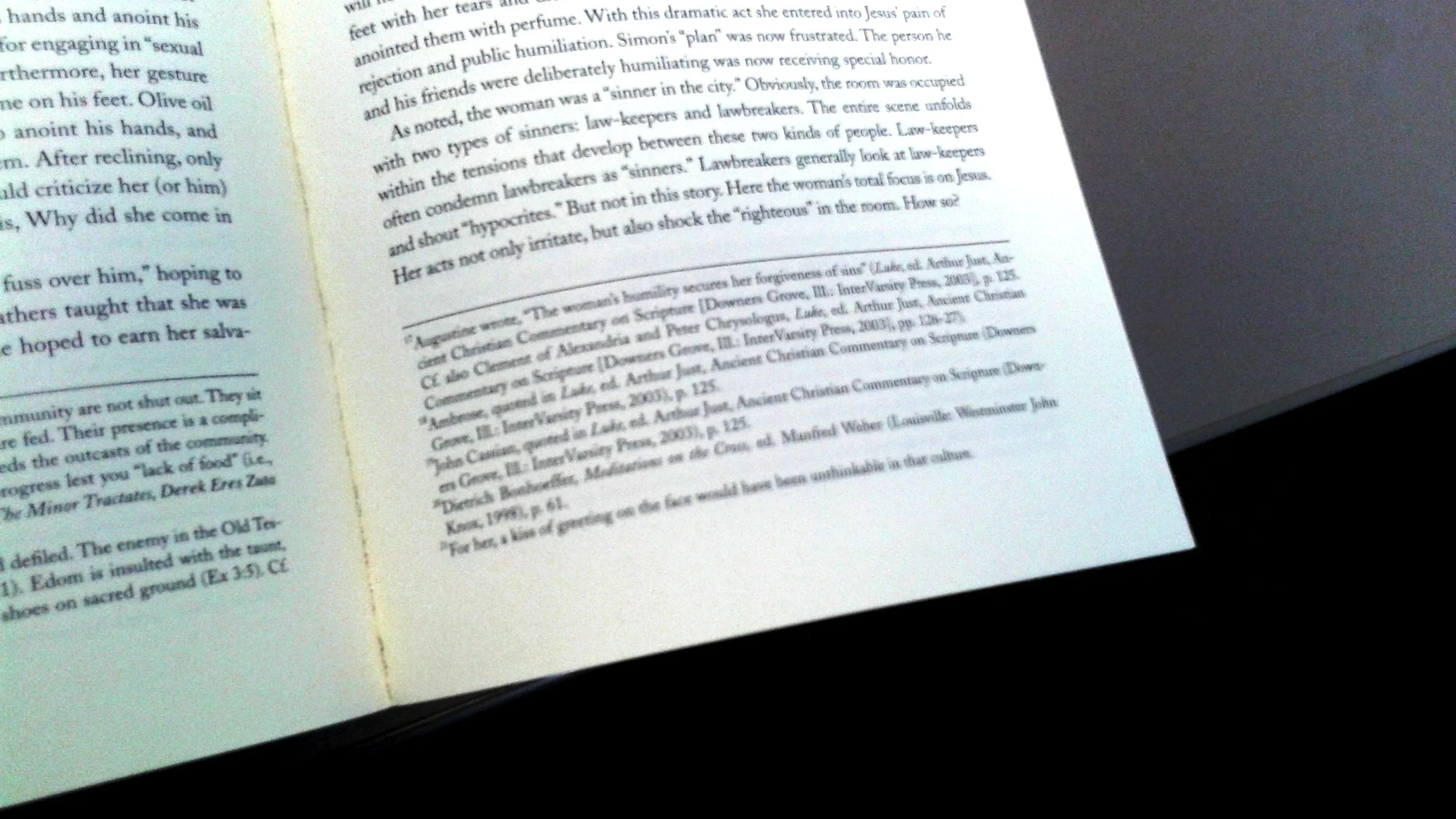Et Al
I’m one of those weird people who find footnotes, addendums, and sidebars fascinating. When I’m browsing in a bookstore and become intrigued by a book’s title, I turn first to the footnotes. I want to know who the author reads, where he got his source material, and what else the author may include in the footnote that is not in the main body of the text. There is a wealth of revealing information in those pesky footnotes, if you take the time to look.
The Bible also contains footnotes, not in the same way that modern books do, with small numbers printed above a completed sentence or sources cited at the bottom of the page or at the back of the book, but footnotes are there all the same. They’re the passages that many people skip, deeming them unimportant or superfluous. Sometimes they occur in those “begat” genealogical passages found throughout the Bible, such as “Abraham begat Isaac” and so on. Page after footnote page of apparently trivial information that most readers find totally boring but may, on closer examination, contain surprising insights.
I love those passages, for often they portend tidbits of information that add depth to the biblical story. The people listed in the “begat” verses, many of whom have intriguing etymologies, were real people who lived lives significant enough to be remembered by their ancestors. An observant reader, with a little curiosity, can sometimes discover biblical gems by digging a little deeper into the text.
Take the last chapter of the Apostle Paul’s Letter to the Romans, Chapter 16. Most of us just skim over this last chapter, thinking that it contains little, if any, significant material. It appears to be just a list of names, many of which we have never heard of, that seemingly have no relevance to Paul’s overall message.
You might even say that Chapter 16 serves as a kind of footnote or addendum to the rest of Paul’s masterful book. Like the acknowledgement page at the end of a modern book that list all the people who assisted the author in getting his work across the finish line, Paul’s litany of names serves a similar purpose. He gives credit or thanks to those who have contributed to his ministry. It is the first century equivalent of an acknowledgement page.
So undervalued is this chapter by some scholars that a number of commentaries on Romans conclude their serious exegesis at the end of Chapter 15, with only a few perfunctory pages given to Paul’s closing remarks in Chapter 16. I find, however, these acknowledgements to be important biographical material about the apostle’s relationships with his contemporaries.
Paul begins the chapter by introducing Phoebe to the church in Rome. She was probably the bearer of Paul’s letter to the church. Phoebe was a deacon in the Christian community and Paul charged her with the important responsibility of carrying his letter to the fledgling church. Moreover, Phoebe probably read the letter to the congregation during a time of worship.
Phoebe, a woman, was an integral part of Paul’s ministry. Such a valued partner was she that Paul tells the church to receive her as a saint. What an insightful piece of information to learn that a first century woman played such a pivotal role in the early Christian church.
Phoebe
Then there was Priscilla and Aquila, who risked their lives for Paul. Wouldn’t you love to know the rest of the story of how this couple put their lives on the line for Paul? If it weren’t for this woman and man, relatively minor characters in the New Testament, Paul’s work may have been dramatically cut short.
Priscilla and Aquila
Paul’s list continues with name after name of little known people whose friendship and love the apostle could not have done without. Kind words are written about each one. Read the list closely. There is so much there that reveals the humanity of Paul, a man dependent on others, as are we all. He owed a debt of gratitude to each person. What a veritable treasure chest of information that helps the modern reader know a little about Paul’s companions who made such a difference.
We could all make a list of people we are indebted to. We know people, past and present, who changed the trajectory of our lives. The teacher who shepherded us through the trig class, without whom we may never have been able to pursue our dream. The coach who saw our potential and helped us be the best we could be both on and off the field. The pastor who taught the Word of God Sunday after Sunday and enlarged our picture of faith. The friend who stood by us during dark moments when the world had collapsed around us. We never would have made it without her.
The list goes on and on. So many people have contributed in immeasurable ways that if we pause from our busy schedules and begin to count them, we discover that we owe a debt of gratitude to so many. And, much like Paul, we thank God every time we remember them.
Thanksgiving offers an opportunity to put our lives on pause for a few days and remember how much we owe to those who have touched our lives in incalculable ways. No one makes it on his own. There are no self-made people. Our parents, family, friends, the people we work with, and countless others have all played a part in shaping who we are and what we have accomplished. We are all debtors!
As I think back to the countless people I’m indebted to, I realize that I can’t even remember all their names. Their faces I can still envision, but I’ve forgotten their names. The woman who tutored me in French, without whom I never would have passed my Ph.D. language exam—what was her name? The custodian who brought me fresh coffee every morning in my first church—I can see his kind face, but his name escapes me. The doctor who first diagnosed my heart murmur and sent me to a specialist—his name has faded from memory. So many people are part of my story but many of their names have been lost. Still, I thank God for every one of them.
I suppose if I were to write down my list of the myriads of people who were always there for me, I would have to insert “et al” for all the ones whose names I can no longer remember. Et al, a common Latin abbreviation found in footnotes, means “and others.” And there are so many “Others!” Countless “Others!”
Oh, how I love footnotes. Don’t tell me that footnotes are boring!
Happy Thanksgiving!





